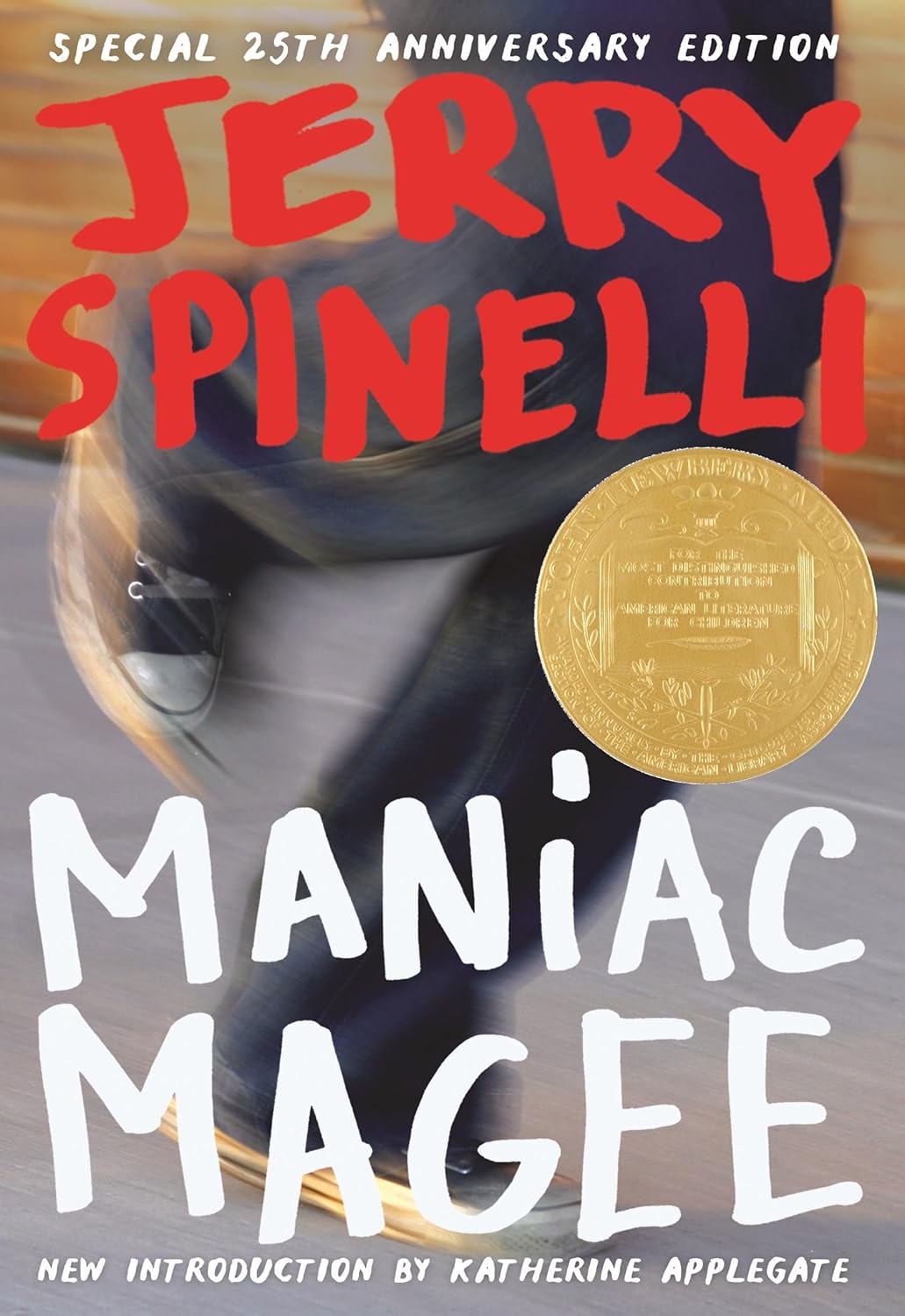
Maniac Magee
Chaper 23
by Spinelli, JerryIn Chapter 23 of *Maniac Magee*, Grayson surprises Maniac with a box of butterscotch Krimpets, a treat that feels like a slice of heaven to the boy. Grayson then takes Maniac to the YMCA, where he lives, and directs him to the showers to clean up after his ordeal. Maniac revels in the warm water, reminiscing about his past baths with younger children, despite the sting of his scratches. The shower marks a symbolic return to civilization, washing away the grime of his recent struggles.
After his long shower, Maniac finds Grayson waiting with fresh clothes—his own oversized ones—as the old man humorously claims to have disposed of Maniac’s tattered rags with exaggerated military precision. The two share a laugh over the ill-fitting attire before Grayson takes Maniac shopping for proper clothes. They spend the afternoon driving around town, bonding over Krimpets and conversation. The chapter highlights the growing camaraderie between the two, as Grayson begins to take a paternal interest in Maniac’s well-being.
Grayson probes Maniac about his future, asking about work, shelter, and school. Maniac quickly suggests working for the park and insists on staying in the “baseball room,” but he becomes evasive when school is mentioned. His refusal to attend school stems from a deeper emotional conflict—he associates school with the instability of his life, lacking a true home to return to each night. Grayson, though puzzled, senses the boy’s resolve and doesn’t press further, quietly contemplating an unspoken idea forming in his mind.
The chapter ends with Maniac’s defiant declaration that he will run away if forced to go to school, a statement that oddly comforts Grayson. The old man feels a faint, almost imperceptible idea taking root—a potential solution to Maniac’s plight. As they continue driving, the unspoken connection between them deepens, leaving the reader curious about Grayson’s thoughts and the next steps in their unlikely partnership. The chapter masterfully blends humor, warmth, and underlying tension, setting the stage for future developments.
FAQs
1. How does Grayson show kindness to Maniac in this chapter, and what does this reveal about their developing relationship?
Answer:
Grayson demonstrates kindness in multiple ways: by buying Maniac a whole box of butterscotch Krimpets (his favorite treat), providing him with clean clothes and a shower at the YMCA, and taking him on a shopping spree for new clothes. These actions show Grayson’s growing paternal care for Maniac, transitioning from their initial meeting in the buffalo pen to a more nurturing relationship. The shared laughter over Maniac drowning in Grayson’s clothes and their afternoon spent eating Krimpets together further illustrates their bonding, suggesting Grayson is becoming a father figure to the homeless boy.2. Analyze Maniac’s refusal to attend school. What deeper emotional reasons does the text suggest for this decision?
Answer:
Maniac’s refusal stems from his complex feelings about home and belonging. The text reveals that he associates school with the painful contrast between temporary “day homes” and permanent night homes. For Maniac, school represents a place where other children have families to return to, while he has none. His poignant reflection on addresses and shared toasters underscores his longing for stability and family connection. This explains his stance: he won’t endure the daily reminder of what he lacks (“I’ll just start running”), showing how his homelessness extends beyond physical needs to emotional security.3. What significance does the “worm of a notion” Grayson feels represent in terms of the story’s development?
Answer:
The recurring “worm of a notion” symbolizes Grayson’s subconscious consideration of offering Maniac a permanent home. Though he initially ignores the idea, its persistence (brushing past “claptrap” and later tickling him) foreshadows a potential turning point in both characters’ lives. This subtle imagery suggests Grayson is grappling with the responsibility and emotional commitment of caring for Maniac long-term. The chapter ends with Grayson continuing to drive—literally and metaphorically—toward an unspoken decision, building narrative tension about whether he’ll act on this growing instinct to provide stability for the boy.4. Contrast the symbolic meaning of the shower scene with the earlier buffalo pen encounter. How do these moments reflect Maniac’s journey?
Answer:
The buffalo pen represented Maniac’s lowest point—filthy, exhausted, and disconnected from society. In contrast, the shower scene marks his symbolic rebirth into community: the water stings his scratches “welcome-back-to-town,” cleansing both physically and emotionally. While the pen emphasized isolation (buffalo as outcasts), the YMCA shower represents reintegration. Grayson’s role shifts too—from an amused observer at the pen to an active caretaker providing soap, clothes, and laughter. Together, these scenes frame Maniac’s transition from marginalization to the beginnings of belonging through human connection.
Quotes
1. “Maniac thought he must have climbed out of that buffalo pen right into Heaven.”
This quote captures Maniac’s overwhelming joy at receiving the butterscotch Krimpets, symbolizing how small comforts can feel monumental after hardship. It marks a turning point where his circumstances begin to improve.
2. “The shower needles stung his scratches, but it was a good, welcome-back-to-town stinging.”
This poignant description shows Maniac’s complex relationship with pain and belonging. The physical sting paradoxically represents his return to civilization and human connection.
3. “School. Home. No, he was not going to have one without the other.”
This powerful statement reveals Maniac’s core philosophy about belonging. It explains his resistance to school as stemming from his need for a complete, stable home life rather than just daytime institutional care.
4. “If you try to make me, I’ll just start running.”
This defiant declaration shows Maniac’s determination to maintain control over his life. It underscores his transient nature while hinting at the deeper trauma behind his resistance to conventional structures.
5. “The old man just looked at him for a while with a mixture of puzzlement and recognition, as though the fish he had landed might be the same one he had thrown away long before.”
This vivid simile beautifully captures Grayson’s dawning realization about Maniac’s situation. It suggests both men may share similar experiences of displacement and resilience.
